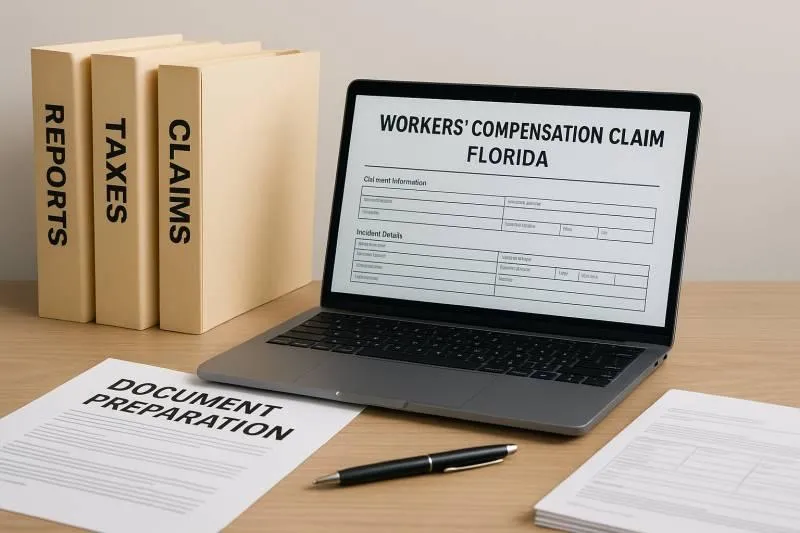Documents Needed to File an OJCC Case:
A Florida Workers’ Compensation Guide
Documents Needed to File an OJCC Case: A Florida Workers’ Compensation Guide
When you’ve been hurt at work in Florida, filing a Petition for Benefits (PFB) with the Office of the Judges of Compensation Claims (OJCC) is often a necessary part of securing benefits. But how do you make sure your claim goes smoothly? Understanding the documents needed to file with OJCC helps ensure your paperwork is complete and your case is processed without unnecessary delays. This guide walks you through what you need, how to stay organized, and ways to avoid common filing mistakes.
Understanding the Florida Workers’ Compensation Filing Process
The process begins with reporting the injury to your employer as soon as possible. Florida law requires workers to report job-related injuries within 30 days. However, even waiting 30 days may complicate or even jeopardize your eligibility for benefits. Once you report the injury, your employer is supposed to contact their insurance carrier, starting the formal investigation. Next, the employer/carrier is supposed to provide you with the necessary medical and lost wage benefits. If the e/c does not provide you the benefits you are legally entitled to, then you must submit a Petition for Benefits and file with the OJCC. Although it’s possible to file a claim without an attorney, we do not recommend it since there are many things that can go wrong. An experienced workers’ compensation attorney understands the legal requirements to filing a PFB for workers’ compensation claims in Florida. To keep your case moving forward, each form and record must be complete, accurate, and submitted on time.
Key Documents and Forms Required for Your Workers’ Compensation Claim
At the heart of your filing is the Petition for Benefits. This document outlines the nature of your injury, what benefits you are requesting, and the facts supporting your claim. It should clearly describe the injury, when it occurred, and the medical treatment and/or compensation you are seeking.
Other important records that are often required to be attached to the PFB include:
Medical documentation: Physician notes, test results, diagnoses, and any paperwork that ties the injury to your job.
Wage and employment records: These include pay stubs, possible tax forms or contracts from your employer or concurrent employment that support your claim for lost wages.
Incident reports and witness statements: These are not required to be attached to the Petition for Benefits but could prove helpful for later discovery as they may provide context and help support the legitimacy of your claim.
These documents are often required to be attached to the Petition for Benefits and if they are not attached, could lead to a dismissal of your claim and benefits sought.
Practical Tips for Organizing Your Documents
Save and store all employment related documents and medical records. Before filing a PFB, review the documents you have in your possession and review the law to determine what documents must be attached to the Petition for Benefits. Save and store both digital and paper versions in labeled folders so you can easily access them during the review process.
Review all ripe claims on the Petition for Benefits to make sure you are not forgetting to include on the PFB. Claims should be listed specifically and accurately, and include dates and contact details. Any incorrect or missing information can cause delays or issues during the OJCC review.
Request detailed medical reports from your healthcare providers to document the requested and recommended treatment and verify they link the injury to your job duties. This documentation helps establish the connection between your condition and the workplace accident and is required to attach to the Petition for Benefits so that you can move forward in obtaining the benefits that have been recommended and the benefits that you are seeking.
Collect all employment documents such as recent pay stubs, contracts, or tax records. If anything is missing, contact your employer or HR department as early as possible or let an experienced workers’ compensation attorney submit a request to produce directly to the employer/carrier.
Label and scan everything so your documents are easy to locate and ready for electronic submission. Keeping digital copies also protects against loss or damage of originals.
Common Filing Mistakes to Avoid with the OJCC
Filing errors can lead to long delays, denied or dismissed claims. or denied claims. These are the most common issues claimants face:
Missing or incomplete documents: Medical records or income details that are missing can weaken or result in the JCC dismissing your claim for benefits.
Wrong information on the petition: Incorrect dates or employer details can create confusion during the review and result in a dismissal of your Petition for Benefits.
Late submission: Filing after the deadline or sending paperwork to the wrong place will usually result in a denial of benefits.
Always double-check the legal requirements before filing your Petition for Benefits (PFB). Use a step-by-step checklist, confirm each required document is attached, and follow up with the OJCC if you don’t receive confirmation.
The Benefits of Electronic Filing
Using the OJCC’s electronic filing system can help you save time, avoid errors, and receive confirmation that your claim has been received.
Make sure all documents are saved in the correct format, usually PDF. This ensures your files are accepted by the system and can be opened without
compatibility issues.
Use clear and descriptive file names to avoid confusion. Naming each document accurately helps both you and the OJCC quickly locate specific forms if follow-up is needed.
Save confirmation receipts or emails from the system in a safe place. These records serve as proof of timely submission and can protect you in case of disputes or delays.
Electronic filing with the OJCC offers a faster, more efficient way to submit your claim documents accurately and on time. It also provides peace of mind through instant confirmations and easier access to your records.
When You May Need Legal Help
In some situations, reaching out to a legal professional may be the best way to protect your rights file a Petition for Benefits, and ensure your documents are filled out correctly so your claim does not get dismissed. A board certified workers’ compensation attorney will prepare your PFB to make sure that your claim is accurate and complete, and the proper documentation is attached before submission. Work comp attorneys know how to word the petition and what is required by law to prove your claim. If disputes arise or your claim is denied, a workers’ compensation lawyer can help fight for your benefits and rights. Your lawyer will represent you in negotiation or mediations, and evidentiary or merit hearings. Getting legal support early in your claim can help avoid delays and lead to a successful, timely outcome.
Take the Next Step with Confidence
Being injured on the job is painful and often stressful. Filing a Petition for Benefits shouldn’t add more confusion or stress to an injured worker. By knowing the legal requirements and attaching the necessary documents, you can file a PFB claim with confidence and improve your chances of a smooth approval process. Start today by reviewing your checklist and collecting what you need. If questions come up, don’t hesitate to reach out to a qualified workers’ comp attorney. Taking action early and staying organized can help you receive the benefits you deserve.

